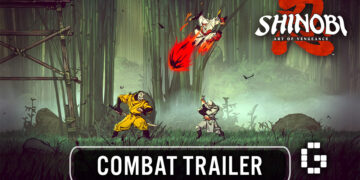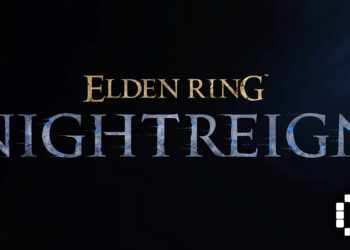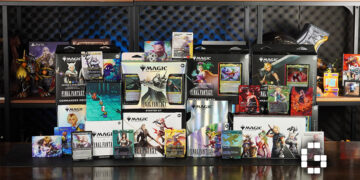With a session at Level Up KL 2021 named “Fireside Chat : Batteries Not Included: Forging Your Own Path As An Independent Developer In 2021“, surely there was no way I could resist making lame jokes in this theme? Featuring Wan Hazmer, Co-Founder and CEO of Metronomik and Michael Mumbauer, Co-Founder & CEO of That’s No Moon, the session was for the duo to essentially chat pretty casually about their experiences being part of major game industry players, and both now with their own studios.
The following has been edited for clarity.

WARMING UP
Both of them catch up briefly, Michael sharing that he’s been learning the guitar. Wan Hazmer reveals that the title comes from Michael, as they joke about how wanting to get some help is pretty much the “indie” experience. Michael’s also finished playing NO STRAIGHT ROADS, both taking the time to share pleasantries too. As it turns out, Wan Hazmer finds Back to the Future 2 more impactful and influential on his game design, so make of that what you will…
LEAVING THE “CUSHY” JOB
Considering how both these men have left pretty big companies, Wan Hazmer is first in the hot seat, getting asked his reasons to leave Square Enix. After all, how many people have dreamt to work on THE Final Fantasy series? He admits he has a bigger dream, in which he wants to transform Malaysia, feeling that the country has so much yet to offer in culture, a view he has expressed before. He saw the potential Malaysia had from attending Comic Fiesta 2015 – a local convention – and had already declared he would eventually leave Square Enix to come home and establish his own company, even as SQEX announced the then-Final Fantasy Versus XIII.

Turning it back on to Michael, himself having a long tenure at Sony Interactive Entertainment Worldwide Studios as Senior Director of the Visual Arts Service Group. In fact, he still held that position a year ago at Level Up SPACEBAR at his panel about “The Next Frontier of Game Experience”. Similarly to an earlier interview we had with him, he considers himself a storyteller at heart.
“Our lives are chapters, and I felt I was at the end of one. Hearing stories like yours (Wan Hazmer) have been really inspiring. I always wanted to return to being a developer, and I wanted to feel ready before I tried again. If not now, when?”
Michael Mumbauer
EXPERIENCE, TALENT, INFLUENCE
In the interest of getting more experience, Wan Hazmer decided to go to Japan, wanting to know what the industry was like at a time where there weren’t many books on its inner workings. Michael then brings up the question of finding talent. Wan Hazmer points out they need people who aren’t developers: accountants, managers, the like. If you limit your scope, you’d be finding the same people rotating in and out of positions. As such, he wanted to have mostly fresh faces instead, assisted by veterans as needed. Michael understandably asks about the “technicalities”, since new people would mean more time spent in training, wouldn’t it? To that, Wan Hazmer says they mostly leave the young ones to their own devices, adding in insights of previous industry practices as needed.
“We look at their portfolio and ask them to justify their thought processes to learn if they’re critical thinkers. I’m also a big advocate of diversity, not just about race, religion, we also learn about their personality and see if they can fill in the gaps in the company.”
Wan Hazmer
Wan Hazmer does admit they have had to cut members, but for the most part, the method has worked, even if it is like jumping into a pool of sharks as he puts it. Michael mentions the comments he’s gotten about leaving Sony, regarding his children and responsibilities. He doesn’t believe there should be much worry, as whatever happens, he would have learnt something regardless. If it succeeds, then great, you’ve done something incredible and have set the foundation for others. If it doesn’t, you can still try elsewhere. Wan Hazmer acknowledges others may not be afforded the same luxury, but he feels that they can create it.

Establishing that Wan Hazmer has been born and bred in Malaysia, Michael brings up all these influences that the former has had exposure to; be it Western media like Back to the Future, or Japan’s animanga, in comparison to Michael’s almost exclusively Western media influence. If you could figure out how to properly assemble this mix, the potential for a truly “global” production is there. Michael calls NO STRAIGHT ROADS a successful blend of the East and West, mentioning the Malay / Malaysian accents within. Yet, Malaysians themselves don’t necessarily see it that way, having grown up on non-local media and seeing that as the standard, and Wan Hazmer wants his game to change that.
As much as people dream to work in the games industry, the infrastructure may not exist. The “easiest” way would then be to establish your own. Metronomik aside, Passion Republic and Lemon Sky Studios are set to pave the way for Malaysia’s game industry.
WHAT MAKES “THAT’S NO MOON” ITSELF?
It somewhat feeds back into the whole “own studio” thing. Besides Michael himself, That’s No Moon has other equally veteran members who have chosen to start fresh, so to speak. The names are not “indie”, unlike your typical perception of a small, “scrappy” studio.
“I hope they underestimate us. That’s kind of the point, that we’re going to be capable of a lot more than the industry thinks we [are].”
Michael Mumbauer
That’s No Moon rallied together out of a love for games, specifically the third person action adventure genre. Their goal is now to make something in this genre that they’ve always wanted, but has yet to be done. After so long in big studios, there is that level of polish and refinement that the product is expected to have, and people become risk-averse. Since they’re their own studio, basically everything becomes risky. Any money they get works as a vote of confidence for their talent.

Money is definitely a factor for many indie companies, of course. Michael admits pitching is not his forte outside of Sony, describing the basic process as trying to articulate this Idea you have. Overprepare, reduce the possibilities of them asking questions that send you back to step one. For his part, Michael is already very clear on what That’s No Moon wants to do, and he’s already got known faces with him. With a different set of circumstances, he needs to know if he can work with these people, if they know to take the right amount of risk.
WHAT OF “METRONOMIK”?
NO STRAIGHT ROADS was the first of ideas for a non-rhythm game music game, and music / sound itself is a core identity of ideas that Wan Hazmer discussed with cousin and co-founder, Daim Dziauddin. Wan Hazmer sees a lot of correlation between music theory and game design, both having their own rules. He says NO STRAIGHT ROADS is the “most-straightforward” way where they’ve applied rhythm to a game, hinting they have yet more ideas to come.

He has talked at length about crunch, wanting to ensure that they keep to a healthy rhythm. Should it come to that, then they will take longer to fix that. “Openness” is likewise key. With regards to pitching, he believes it’s important to be genuine. As much as you’d like to “overprepare” and appear flawless, don’t forget that passion. NSR was originally a smaller game, but the young ‘uns helped to contribute and make it what it is.
A NARRATIVE?
While he wouldn’t say today’s narrative games are “lacking”, Michael discusses what Jacob (Minkoff, Chief Design Officer and Game Director of That’s No Moon) had coined: Player Protagonist Parity. The choices you make in a game should be in alignment between you as a player and the character, and not be forced into choices you don’t want to make. You’ll find this similarly described with Ludonarrative Dissonance as well.
As COVID-19 remains a problem, having an uplifting story is definitely welcome. Wan Hazmer wants to tell a positive story because it can influence the people who play them. Sometimes, you just want to tell a story to bring people together and that’s okay. The pandemic has not made it easy, but nonetheless, NO STRAIGHT ROADS has shown that infusing your game with your culture can work, and Metronomik’s next game will be leaning even harder into that. It’s not a sequel to NSR, though.
Q&A
We pretty much expect indies to not get much support. What would be the best way to get them a better start?
Wan Hazmer: It’s important to look at your resources, and your team. It’s good to be passionate, but don’t just come up with your dream game. See what they’re capable of, their interests. It’s important that it’s something everyone wants to work on. If you don’t have a programmer, why not use an engine that doesn’t require one?
Michael Mumbauer: Nowadays, you have so many game engines, resources, so how do you start DOING? Look at the scope of work that you solo, or a couple of others, can do. Just recreate or copy something to start, because you can’t make your game when you don’t understand how to do anything at all. Start small and don’t give yourself paralysis over something too big.

Why hasn’t Malaysia made a AAA game?
Michael Mumbauer: Well, what makes AAA? I consider NO STRAIGHT ROADS a AAA game… I played it on a PS5, and while it’s not like The Last of Us 2, but its design was never meant to be LIKE TLOU 2. If you mean a AAA game as in like TLOU 2, then you will. Maybe it’ll be years from now, but as long as the industry continues to move forward, it WILL happen.
Wan Hazmer: My thought process is, is it necessary for us to reach that in the first place? AAA for me is an “old” concept. What you’d want to make is a game that can provide a good experience. Indies can sell a lot of copies too, and the line between “indie” and “AAA” is blurry. For Malaysia specifically, we’re trying to fight on the same level as the others – technology, graphics – and we don’t need to. We have so much more to offer besides that, like our culture, which doesn’t have to be “traditional”, even the “modern” one we have now. Gamifying this can be our weapon.

Our problem is that we’re either not proud of our culture, saying it’s not like Western media or anime, and not liking it OR, we’re too proud and say that just because we’ve made a Malaysian game, everyone would love it. Creating a local setting with a universal, relevant message, will be very important.
To Michael, any highlights working with talent in Southeast Asia?
Michael Mumbauer: Malaysia to me represents the best of both worlds, the East and West, and everyone speaks English. I can basically easily communicate ideas, and they have these ideas from Japanese media, we share the same Western media, and the very unique Malaysian culture. Indonesian, Thai, Vietnamese… each of them are so interesting, and they’re creating an additional curiosity on top of the layer we’re already seeing. I think it’s a heart-forward culture, and I find that connection and it feels like you’re almost like working with family.
Name the best / worst things about being an indie developer.
Wan Hazmer: I think the best thing is not having control. Square Enix gave a lot of creative license, but obviously we couldn’t stray too far from the Final Fantasy IP. The communication is another thing, like with fans. With our NO STRAIGHT ROADS Encore edition, we’re going to be including some 500+ fan art, but in Square Enix, you couldn’t be too close to your fans. If you’re indie, please treasure your fans. NSR has been kept going thanks to our fans, and we keep getting new fan art. The recruitment process is also freer, and you can pretty much recruit or collaborate who you feel is right.
The worst thing I’d say is the relative lack of structure. Your company could easily go haywire, and you don’t necessarily have your own human resource / project manager. It can take up a lot of your time, and be incredibly daunting, so be prepared to invest a lot of your time. Money and cash flow is definitely hell. One of our regrets is not starting our second game during our first, because there’s a limbo between. The revenue doesn’t come immediately, and you’re definitely going to underestimate your costs.

Michael Mumbauer: The idea that you’re starting from a blank slate means your culture is being defined, we’re deciding how we want to be. You don’t have that with a company; you join them, you get a card, and they tell you what the company represents. You don’t feel it as closely in a larger company. As indie, we have the flexibility to make quick decisions; if we’re wrong, we can change it.
For me, there’s communication. I can express myself outside of a company, like be more of myself, less worrying about being a spokesperson for a company though it doesn’t mean I’d suddenly be completely off-brand. The good parts can also be bad, like the flexibility: just because you can, doesn’t mean you should.





![[GUIDE] Fantasy Life i: The Girl Who Steals Time Codes & How to Redeem Them](https://cdn.gamerbraves.com/2025/06/Fantasy-Life-i_Codes_FI-360x180.jpg)




![[EXCLUSIVE] Inside Japan’s Indie Game Revolution – An Interview with BitSummit Organizer Masahiko Murakami](https://cdn.gamerbraves.com/2025/05/BitSummit-Orgainzer_Interview_FI-360x180.jpg)
![[EXCLUSIVE] The Art of Adaptation: Developer Interview Details the OVERLORD Mobile RPG Lord of Nazarick](https://cdn.gamerbraves.com/2025/05/Lord-of-Nazarick_Interview_FI-360x180.jpg)
![[EXCLUSIVE] Taking Gundam in Bold New Directions – Interview with GQuuuuuuX Director Kazuya Tsurumaki](https://cdn.gamerbraves.com/2025/04/Kazuya-Tsurumaki_Interview_FI-1-360x180.jpg)


![[SEA Exclusive] From Shadows to Shipwrecks – Jennifer English Talks About Bringing Emotional Depth to Clair Obscur: Expedition 33](https://cdn.gamerbraves.com/2025/04/Clair-Obscur-Jennifer-English_Interview_FI-360x180.jpg)

![[EXCLUSIVE] Do the Game Interview – An Intimate Look at the Challenges of Game Development](https://cdn.gamerbraves.com/2025/04/Do-the-Game_Interview_FI-1-360x180.jpg)
![[EXCLUSIVE] Interview with the Minds Behind of Den of Wolves – 10 Chambers’ New Sci-Fi Heist FPS](https://cdn.gamerbraves.com/2025/04/Den-of-Wolves_Interview_FI-360x180.jpg)
![[Level Up KL 2021] Fireside Indie Chat with Michael Mumbauer and Wan Hazmer](https://cdn.gamerbraves.com/2021/09/fireside-with-hazmer-and-michael-750x392.jpg)









